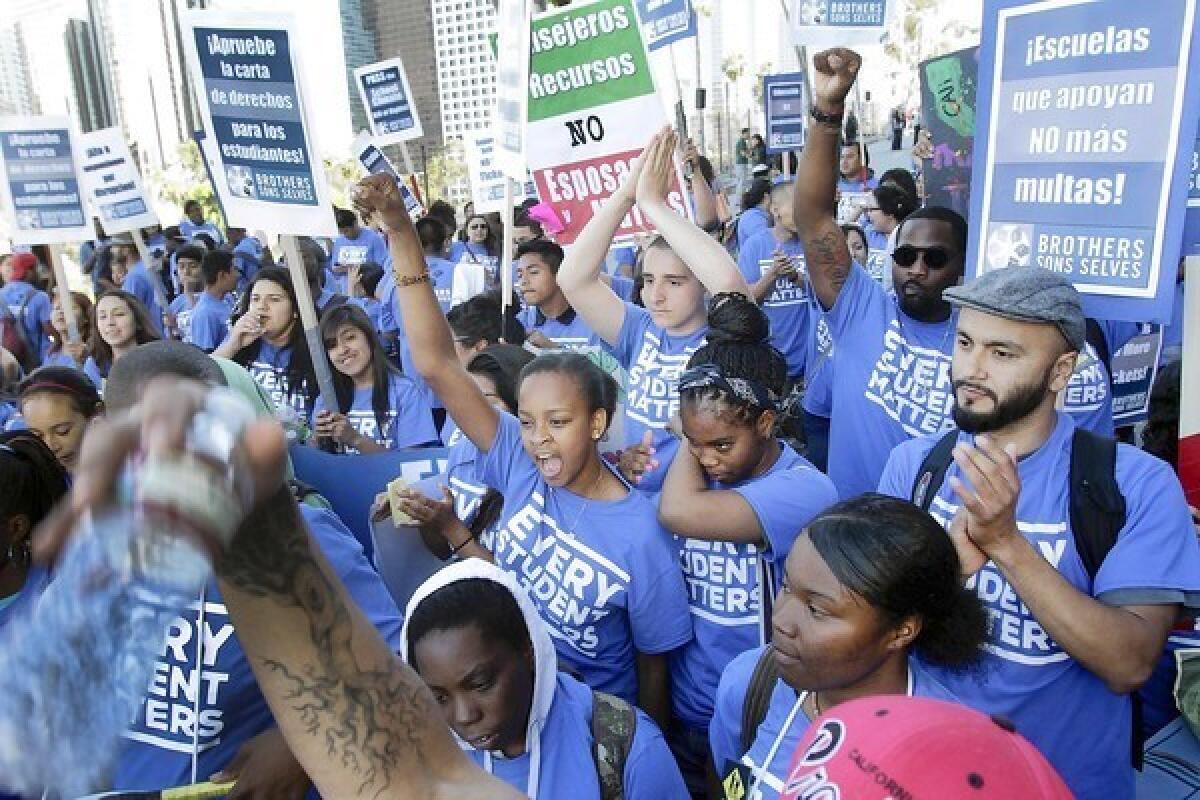California moves to stop excessive punishment of Black and disabled students at three districts

- Share via
Three school districts in Barstow and Oroville discriminated against Black students and students with disabilities by excessively disciplining them, prompting the state to impose five-year corrective plans, California Atty. Gen. Xavier Becerra said Tuesday.
The California Department of Justice found that Barstow Unified School District, Oroville City Elementary School District and Oroville Union High School District had a “systemic over-reliance on punitive, exclusionary discipline against Black students and students with disabilities,” according to a news release from Becerra’s office. It also found that the districts failed to respond adequately to complaints of harassment and discrimination, including in some cases the use of racial slurs.
“Our society is built on how we educate our children,” Becerra said in the release. “When our schools use punishment discriminately, it has lasting consequences. And when our schools fail to adequately address bullying or racial harassment, we all suffer.”
Among the department’s findings were the following:
- At Barstow Unified, with 6,435 students in the last school year, Black students and students with disabilities were more likely to be punished and suspended than students of other races and without disabilities.
- At Oroville City Elementary, Black students lost days of school due to suspension at a rate 18 times the statewide average. Middle school students with disabilities received almost twice as many days of punishment as students without disabilities. The district north of Sacramento serves 2,739 students.
- At Oroville Union High, with 2,237 students, Black students were 56% more likely to be suspended from school than white students for the same types of behaviors.
Duane Jones, an Oroville parent with sons in elementary and high school, both of whom are Black, said each had been suspended after reporting bullying and harassment by white students to teachers, only to see them take no action. The older son, now 17, was the target of racial slurs involving the N-word, and the younger son, now 10, was bullied by another student who took food off his lunch plate, Jones said.
When the harassment escalated and Jones’ sons fought back, they were suspended — but the white students were not, he said.
His younger son still has not recovered from his in-school suspension, during which he was left alone all day in the principal’s office. He has trouble controlling his emotions and can become inconsolable when things don’t go his way, Jones said.
“Our black children have it hard enough trying to learn something and trying to get a good foot in this lifetime without losing their education,” Jones said.
The department began its investigations in May 2019. It would not comment on the original source of complaints about the districts.
The findings come about a year after California extended its ban on so-called willful defiance suspensions for disruptive behavior from grades K-3 to grades K-8, though students may still be suspended for more serious actions. Research has shown that suspensions and the accompanying loss of instructional time disproportionately affect students of color, particularly Black students.
The investigation found that Barstow Unified illegally suspended students in grades K-3 for disruption and defiance, the attorney general’s complaint against the district said. Seventy percent of the students suspended were African-American, though just 20% of its students overall are. The district also routinely used suspensions for relatively minor behaviors, including use of vulgar or obscene language, the complaint said.
In Oroville City Elementary School District, data showed that elementary schools reported high numbers for reports of physical injuries at the district’s elementary schools. This “raised concerns,” the complaint said, either that minor offenses are being incorrectly coded as more serious ones in order to suspend students for them, which would be illegal, or that the campuses are unsafe — “or both.”
And at Oroville Union High School District, the attorney general’s office found that use of “exclusionary punishment” — removing students from class — was excessive, with 90% of defiance or obscenity incidents resulting in in-school or out-of-school suspensions.
All three school districts have agreed to five-year corrective action plans, to be overseen by an independent monitor. The plans include revising student discipline policies, regularly analyzing student discipline data for evidence of bias, strengthening counseling services, putting in place systems to meet students’ academic and emotional needs, and improving procedures for handling student complaints.
The settlements, announced Tuesday, follow a series of actions the California Department of Justice has taken against school districts that have implemented discriminatory practices. Last year, Becerra announced the state’s first desegregation order in 50 years, in the Sausalito Marin City District. It also has reached settlements with the Stockton Unified School District and the Mojave Unified School District.
“What we’re finding is that ... some of our schools and the personnel in our schools are not complying with the requirements of the law,” Becerra said at a news conference Tuesday. “Most of the time it has a lot to do with resources. Oftentimes it has a lot to do with changing laws that folks aren’t keeping pace with. And unfortunately sometimes it’s that there is a negligence. ... Whatever the case, it’s the job of the Department of Justice to ... make sure that every child is getting the education not just that they deserve, but that they’re entitled to.”
All three district superintendents said they were committed to ensuring equitable school environments. Supt. Jeff Malan of Barstow Unified said the district would “leverage” its already existing behavioral interventions, extend bilingual services and recruit new talent. Supt. Corey Willenberg of Oroville Union High said that as a result of the settlement, his district had already modified its student discipline policy and employee training program.
More to Read
Sign up for Essential California
The most important California stories and recommendations in your inbox every morning.
You may occasionally receive promotional content from the Los Angeles Times.














